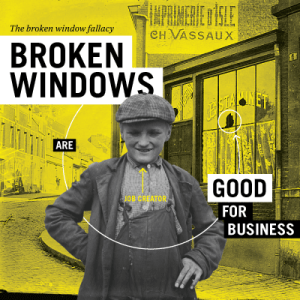The Broken Window Fallacy
Broken Windows are good for business.
The Broken Window
● A man who has $100.
● The punk kid decides not to be a punk, leaves the window unbroken.
○ How does the man spend his $100
■ How ever he wants.
■ This is unseen.
○ The shopkeeper could have bought some shoes
■ The shoe maker makes money
■ He buys groceries. The grocer makes money.
■ The grocer saves the money. Now the money can be lent to someone who wants to start a new business.
● It creates a domino effect of money moving through the economy.
● But! On net, society is better off to the tune of one window, and the market is more true to the desires of the society.
○ A punk kid throws a rock through the mans window.
■ How does the man spend his $100?
● He pays the glazier to have the window replaced.
● This is seen
■ But someone comes along and says “Look at the bright side. This creates jobs.”
■ Who benefits?
The glassmaker
The glazier makes money
The delivery truck driver makes money
It creates a domino effect of money moving through the economy.
■ Summary: The man has a replacement window, and less money.
Real Life Windows
● Destruction happens:
○ Natural Disasters
○ Terrorist Attacks
○ Wars
● The inevitable optimist with the silver lining:
○ “It’s good for the economy. Rebuilding creates jobs.”
○ “We have to spend money replacing what is destroyed. This will stimulate the economy.”
■ Who benefits when things are destroyed?
● Construction companies
● Government contractors
● Roofing companies
● What is unseen is who loses when things are destroyed:
○ Insurance companies
○ Homeowners
○ The Taxpayer
■ When insurance companies fix things, premiums go up for everyone.
■ When things get destroyed, your tax dollars are spent.
● Now you have less to spend on apps you really want.
● In war a city is destroyed.
○ Without a war, there are opportunities for the same resources to be applied to more fruitful purposes.
○ Instead of rebuilding a destroyed city, the resources could have been used to improve and enlarge the city or build a brand new city.
Production, not destruction, creates prosperity.
Sources:
“That Which is Seen and That Which is Unseen” Fredric Bastiat, 1850
http://www.learnliberty.org/videos/the-broken-window-fallacy/
https://www.youtube.com/watch?v=UPmo2e-bAMQ

